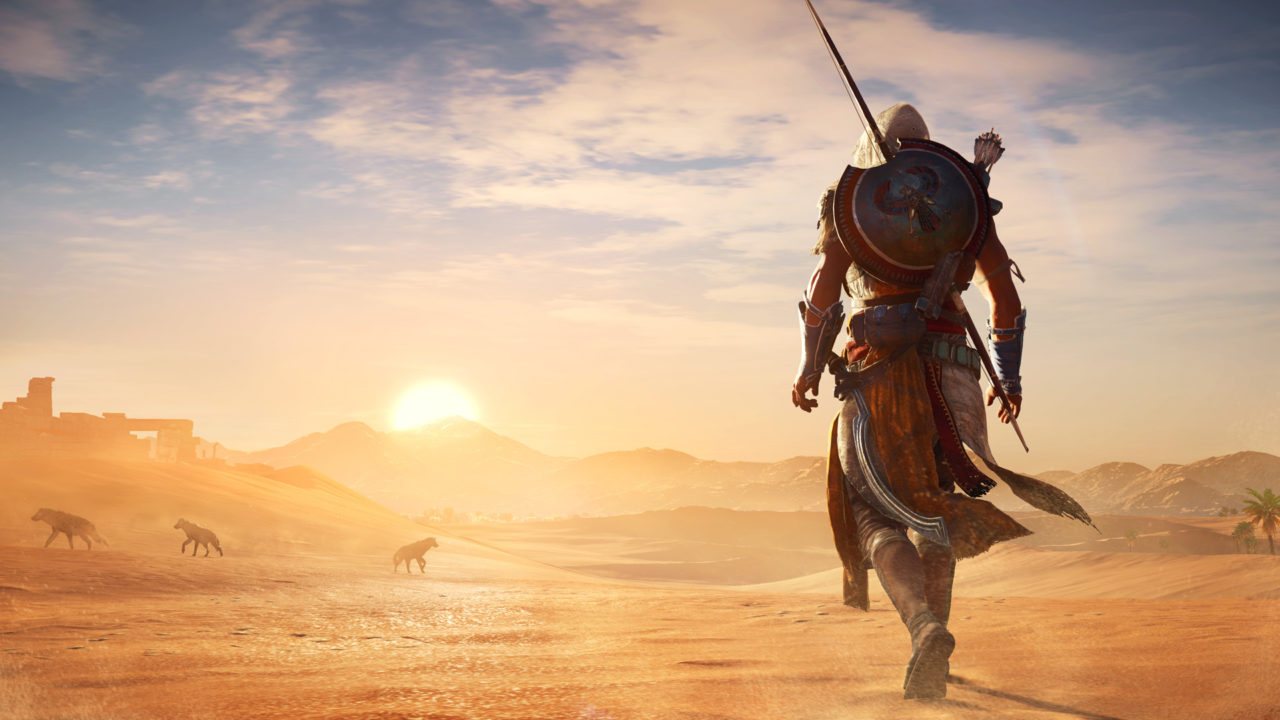There was a time when I couldn’t wait for a new Assassin’s Creed game. Assassin’s Creed 2, Brotherhood, Revelations, Assassin’s Creed 3, Black Flag; a run of truly great games. Sure, each of them had their particular faults but overall they were fantastic experiences and each added something special to the legacy of the franchise. Then the series began to decline in quality and therefore so did my interest. Rogue, Unity and Syndicate were all adequate games but the spark was gone and the franchise diminishing. While once I was into the overall story and lore I now stopped caring. Then, after a two-year break, Assassin’s Creed Origins was released and reignited my passion for the franchise. So how did the game manage it? What did Origins get right that the previous entries got wrong?
It may initially sound silly but I’ve learnt a lot about history through Assassin’s Creed. Not only does the series contain historical information but it also fueled in me a passion to find out more about specific places and events after playing. I went to Rome because I loved the city in Assassin’s Creed Brotherhood and could traverse the city with ease because I had the game’s map burned into my brain. Not an episode of University Challenge goes by without some information I’ve either directly or tangentially found out through Assassin’s Creed coming in useful. The passion for history in Assassin’s Creed felt less prevalent in Unity and Syndicate however with it being limited to the odd historical character turning up to spew a famous quote before giving you a mindless quest. Thankfully Origins goes all in on the real life historical backdrop of Egypt, creating a version of the country as it was, complete with explorations of the religions, society and politics at the time which is thanks to Ubisoft Historical Researcher Maxime Durand. The game does of course take liberties when needed but you can feel the effort made towards historical accuracy every time you pick up the controller.
I think it was a genius move at this point in the franchise, the tenth main instalment, to go back to the beginning of the Assassin Order. It allows the game to be both unstrained by existing canon and yet be so important to the canon. Unlike Unity and Syndicate, Origins doesn’t need to fit snugly into time periods which the lore has already touched. Instead it has free range to tell its story any way it wants as long as at the end it sets up the core conflict of the series which is easy enough. Because we are back at the beginning, the ideas of The First Civilisation and the Pieces of Eden are re-introduced because the characters in the game are just discovering them for the first time which makes the game perfect for newcomers of the series and a kind of “Soft Reboot” to use that increasingly overused phrase.
Egypt was the perfect location for the game to be set because it’s so totally different to the dark and oppressive cities of Paris and London that dominated the last two games. Finally, we get a true open world full of a variety of landscapes from grand cities, small settlements, mountain ranges, deserts and the oases within. It’s an open world that begs for exploration and thankfully it rewards it too. A couple of times I cleared out military outposts and gained a quest item without starting the quest. Later I started the quest and I already had the item the NPC was looking for resulting in a quick exchange and no need to redo something I had already done. I always wanted to know what was over the next hill or sand dune, whether it be a settlement or a pack of wild animals, and I was addicted to the game until I completed it 100%. Egypt also looks incredible with Origins capable of some brilliant visuals that made my upgrade to 4K with a new TV and a PS4 Pro worth it.
While repetitive and simplistic I will always love the combat of the Ezio Assassin’s Creed games and I was wary of changes to the combat in future instalments. My fears came true when Unity was released and I hated the combat and Syndicate wasn’t much better, although overall Syndicate is a much better game. Again, I was wary of the combat in Origins when I watched the E3 demos and heard the developers describe it but on obtaining the game the combat was a nice surprise. While it’s not as complex as the developers made out when describing it, I like it, especially using a shield and a multitude of different styles of melee weapons and bows. I also like that Bayek isn’t invincible and can only take on a couple of enemies at once and you have to think about how to kill them instead of a general hack-and-slash. That is until you reach level 40 and you can run into any enemy, flaming sword in hand, and they’ll be dead within seconds. Hopefully the level raises in the DLC will change this.
For better or worse, mostly better, like most Ubisoft franchises, Assassin’s Creed Origins has copied the Far Cry model. There is a main quest but most of your time is spent completing separate activities and exploring the open world for military outposts to take over. The outposts just don’t get boring and allow for different play styles which the game supports. I often start out stealthy but by the end I’m lobbing fire bombs at the reinforcements set to kill me after I do something loud and foolish. Happily, Origins also (semi)embraces some RPG elements from extensive skill trees, upgradable weapons, crafting and a simplistic loot system which, while enjoyable, I hope is improved upon with the next game.
The characters of Origins are a big step up from the flat protagonists of the last couple of games with Bayek and Aya being fascinating, both when together and apart. Their story is personal and a little generic but it doesn’t go where I expected and I really like where the game leaves them and I’d happily have a sequel to continue their tale. The villains are once again a disappointment however and garner little screen time, a problem that has plagued Assassin’s Creed for years now. Thankfully the game gives us the best rendition of a historical character since Leonardo da Vinci in Assassin’s Creed 2 with Cleopatra. Her motivations remain ambiguous for most of the narrative and the game captures her incredible charm and strength as we see her rise to power.
Origins answered my prayers when I first took control of Layla, the first named playable present-day character since Desmond died in Assassin’s Creed 3. Unlike some, I love the modern-day stuff in Assassin’s Creed. Or at least I did for the first 5 games. After AC3 it seems that Ubisoft lost interest, pushed it to the side line and made it even more convoluted. Origins holds promise though with an interesting character who I hope gets expanded on in the future. I’m all for a present-day heavy AC game and while I doubt that will ever happen I’m happy it is at least still a focus going forward; hopefully more time will be spent in these sequences in future instalments.
There are some interesting ‘First Civilisation’ messages aimed at Layla throughout the game which seem to hint at the future of the franchise, albeit in a confusing manner which had me turning to Reddit to find out what they could actually mean. Apparently, the Animus is a kind of time travel and Layla has to perceive time differently going forward. Could this mean Layla will somehow time travel in the future, without the Animus, and actually enter the past and change events. Maybe to stop Juno who is also brought up in these messages which state that Desmond only prolonged the inevitable. The fact that I am theorising and actually care about this series again is proof that Origins has revitalised the franchise, both in gameplay and narrative, and for the first time in years I’m once again looking forward to the next Assassin’s Creed game.
What are your thoughts regarding Assassin’s Creed Origins? Let me know in the comments and geek out with me about TV, movies and videogames on Twitter @kylebrrtt.








